Comprehensive Guide to Garden Maintenance in Hounslow
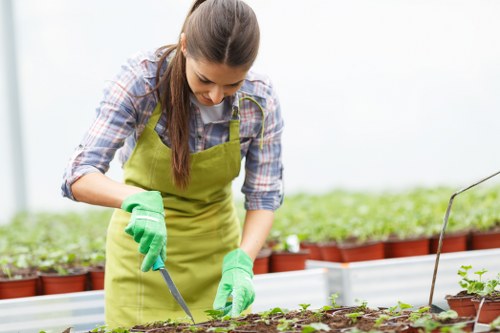
Introduction to Garden Maintenance in Hounslow
Maintaining a beautiful garden in Hounslow requires dedicated care and understanding of the local climate and soil conditions. Whether you're a seasoned gardener or a beginner, consistent upkeep ensures your garden remains vibrant and healthy throughout the year.
Garden maintenance involves a variety of tasks, from regular watering and pruning to seasonal planting and pest control. In Hounslow, with its unique geographical location, gardeners must tailor their strategies to suit the local environment.
Proper garden maintenance not only enhances the aesthetic appeal of your outdoor space but also contributes to the overall health of your plants. In this guide, we'll explore essential maintenance practices tailored specifically for gardens in Hounslow.
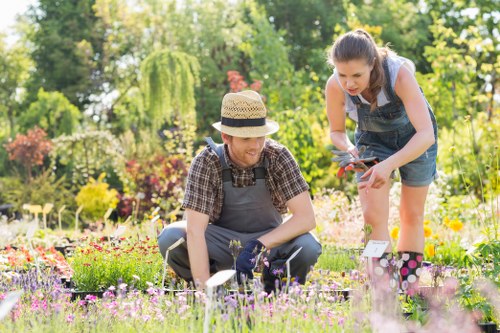
Understanding the Hounslow Climate
Weather Patterns
Hounslow experiences a temperate maritime climate, characterized by mild winters and cool summers. This climate influences the types of plants that thrive and the maintenance schedules gardeners should follow.
Rainfall is evenly distributed throughout the year, reducing the need for extensive irrigation systems. However, occasional dry spells may require supplementary watering to keep plants healthy.
Understanding these weather patterns allows gardeners to plan their planting schedules, choose appropriate plant species, and implement effective maintenance routines.
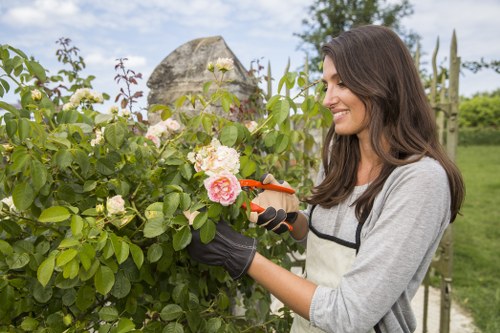
Essential Garden Maintenance Tasks
Regular Weeding
Weeding is a fundamental aspect of garden maintenance. In Hounslow's fertile soil, weeds can quickly overtake desirable plants, competing for nutrients and water.
Regular weeding sessions help keep your garden tidy and your plants healthy. It's best to weed in the spring and autumn when the soil is moist, making it easier to remove unwanted plants.
Using mulch can also suppress weed growth, reducing the frequency of weeding required and conserving soil moisture.
Pruning and Trimming
Pruning is essential for maintaining the shape and health of your plants. It encourages new growth, improves air circulation, and removes diseased or damaged branches.
Different plants require different pruning techniques. For instance, flowering shrubs should be pruned after they bloom, while spring-flowering plants are best pruned in late winter.
Regular trimming not only enhances the appearance of your garden but also promotes robust plant growth.
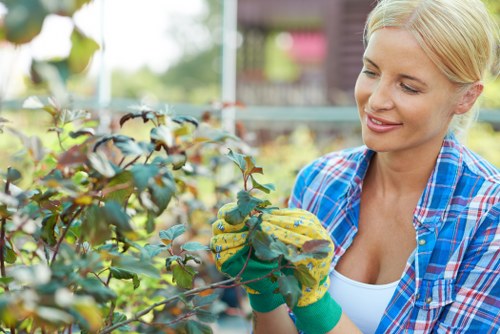
Seasonal Garden Maintenance
Spring Maintenance
Spring is a critical time for garden maintenance. As the weather warms, it's time to prepare your garden for the growing season.
Tasks include clearing out winter debris, planting new seeds, and fertilizing your soil to provide essential nutrients for new growth.
Spring is also an ideal time to inspect your plants for any signs of pests or diseases, allowing you to address issues before they escalate.
Summer Upkeep
During the summer months, maintaining adequate moisture levels is paramount. Regular watering, especially during dry spells, ensures your plants remain healthy.
Mulching can help retain soil moisture and regulate temperature, reducing the stress on your plants during the hot months.
Additionally, summer is a great time for harvesting vegetables and flowers, enjoying the fruits of your hard work.
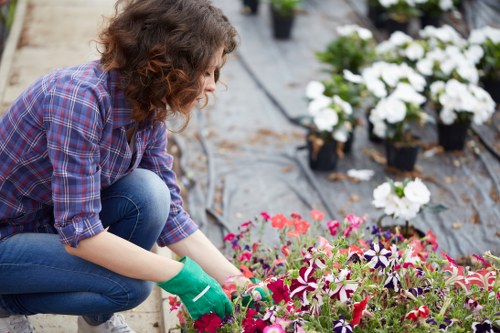
Choosing the Right Plants for Hounslow Gardens
Climate-Adapted Species
Selecting plants that are well-suited to Hounslow's climate ensures easier maintenance and better growth. Native species are often the best choice as they are adapted to local conditions.
Some popular choices include lavender, which thrives in well-drained soil, and roses, which are resilient and offer vibrant blooms.
Incorporating a mix of perennials and annuals can provide year-round interest and continuous blooms throughout the seasons.
Soil Health
Healthy soil is the foundation of a thriving garden. Conducting soil tests can help you understand its composition and pH levels, allowing you to amend it as needed.
Adding organic matter like compost improves soil structure, enhances fertility, and promotes beneficial microbial activity.
Regularly amending your soil ensures it remains rich and capable of supporting diverse plant life.

Pest and Disease Management
Integrated Pest Management (IPM)
Effective pest control is crucial for maintaining a healthy garden. Integrated Pest Management (IPM) combines biological, cultural, and chemical methods to manage pests sustainably.
Encouraging natural predators, such as ladybugs and birds, can help keep pest populations in check without harmful chemicals.
Regular monitoring and early intervention are key components of IPM, preventing minor issues from becoming major problems.
Common Garden Pests in Hounslow
Caterpillars, slugs, and aphids are common pests in Hounslow gardens. Identifying and understanding these pests allows for targeted and effective control measures.
Using barriers like netting and employing organic pesticides can manage infestations while minimizing environmental impact.
Maintaining plant health through proper watering and fertilization also makes plants more resistant to pests and diseases.

Watering Strategies for Hounslow Gardens
Efficient Irrigation Systems
Implementing efficient irrigation systems, such as drip irrigation or soaker hoses, ensures that water is delivered directly to the plant roots, minimizing evaporation and waste.
Scheduling regular watering during early mornings or late evenings reduces water loss and promotes deeper root growth.
Adjusting watering schedules based on weather conditions and plant needs optimizes water usage and maintains garden health.
Rainwater Harvesting
Harvesting rainwater is an eco-friendly way to supplement your garden's water supply. Installing rain barrels or other collection systems captures runoff, providing a sustainable water source.
Rainwater is often softer and free from chemicals found in tap water, benefiting plant health and reducing dependency on municipal water supplies.
Integrating rainwater harvesting into your garden maintenance plan promotes sustainability and resource conservation.

Soil Health and Fertilization
Soil Testing and Amendment
Regular soil testing provides insights into nutrient levels and pH balance, guiding your fertilization strategy.
Amending soil with organic matter, such as compost or manure, enhances fertility and structure, promoting robust plant growth.
Tailoring fertilizer types and applications based on soil test results ensures that your plants receive the necessary nutrients without over-fertilization.
Organic vs. Synthetic Fertilizers
Choosing between organic and synthetic fertilizers depends on your gardening philosophy and plant needs. Organic fertilizers improve soil health and support beneficial microorganisms, while synthetic fertilizers offer precise nutrient control.
Balancing both types can provide optimal plant growth and maintain long-term soil fertility.
Understanding the benefits and drawbacks of each allows you to make informed decisions for your garden's sustenance.

Practical Tips for Effective Garden Maintenance
Creating a Maintenance Schedule
Establishing a maintenance schedule helps ensure that all necessary tasks are performed regularly and on time.
Organizing tasks by season and priority prevents overwhelm and promotes systematic garden care.
Using tools like calendars or garden planning apps can streamline your maintenance routine and track progress.
Using the Right Tools
Investing in quality gardening tools makes maintenance easier and more efficient. Essential tools include pruners, hoes, rakes, and watering systems.
Regularly maintaining your tools, such as cleaning and sharpening, extends their lifespan and ensures effective performance.
Choosing ergonomic tools can reduce strain and make gardening activities more enjoyable.

Professional Garden Maintenance Services in Hounslow
Benefits of Hiring Professionals
While DIY garden maintenance is rewarding, hiring professional services in Hounslow can offer expertise and save time.
Professionals bring specialized knowledge of local plant species, soil conditions, and climate, ensuring tailored care for your garden.
Outsourcing maintenance tasks allows you to focus on enjoying your garden without the physical demands of upkeep.
Choosing the Right Service Provider
Selecting a reputable garden maintenance service involves checking credentials, reviews, and the range of services offered.
Ensure that the provider aligns with your gardening goals and can address specific needs, such as pest control or landscape design.
Transparent pricing and clear communication are essential factors in establishing a successful partnership with a maintenance service.

Sustainable Practices for Garden Maintenance
Eco-Friendly Gardening Techniques
Adopting sustainable gardening practices benefits both your garden and the environment. Techniques include composting, using organic fertilizers, and conserving water.
Planting native species reduces the need for excessive watering and fertilizers, as they are adapted to the local climate.
Implementing recycling practices, such as using garden waste for compost, minimizes waste and enriches soil health.
Creating Wildlife-Friendly Gardens
Encouraging wildlife in your garden promotes biodiversity and natural pest control. Planting a variety of flowers and shrubs attracts pollinators and beneficial insects.
Providing habitats, such as birdhouses and insect hotels, supports local wildlife populations and enhances garden ecosystems.
A wildlife-friendly garden fosters a balanced environment, reducing the need for chemical interventions and promoting natural harmony.

Common Challenges in Garden Maintenance and Solutions
Pest Infestations
Pest infestations can severely impact garden health. Identifying pests early and implementing appropriate control measures is crucial.
Using natural predators, organic pesticides, and physical barriers can effectively manage pest populations without harming beneficial insects.
Maintaining plant health through proper watering and fertilization also enhances resistance to pest attacks.
Disease Management
Plant diseases, such as fungal infections and bacterial wilt, can be detrimental to your garden. Preventive measures include good sanitation, proper spacing, and resistant plant varieties.
Promptly removing and disposing of affected plant parts prevents the spread of diseases to healthy plants.
Implementing a regular inspection routine helps in early detection and management of plant diseases.

Enhancing Garden Aesthetics Through Maintenance
Design and Layout
An aesthetically pleasing garden balances form and function. Regular maintenance ensures that plants are well-shaped and arranged harmoniously.
Implementing design principles, such as focal points and color coordination, enhances the visual appeal of your garden.
Pruning and trimming contribute to the overall structure and beauty of garden plants, creating an inviting outdoor space.
Seasonal Decorations
Incorporating seasonal decorations adds charm and personality to your garden. Items like garden lights, ornaments, and seasonal plants can transform your space throughout the year.
Adjusting decorations to align with seasonal changes keeps your garden fresh and engaging.
Thoughtful decorations complement the natural elements of your garden, enhancing its overall aesthetic.

Tools and Technologies for Modern Garden Maintenance
Smart Irrigation Systems
Advancements in technology have introduced smart irrigation systems that optimize water usage based on weather data and soil moisture levels.
These systems can be controlled remotely, allowing for precise watering schedules and reducing water waste.
Integrating smart irrigation enhances efficiency and supports sustainable garden maintenance practices.
Garden Management Apps
Garden management apps offer tools for planning, scheduling, and tracking maintenance tasks. They provide reminders for watering, fertilizing, and pruning based on your garden's needs.
These apps often include features like plant databases, pest identification, and progress tracking, aiding in effective garden management.
Utilizing technology in garden maintenance streamlines tasks and enhances productivity.

Conclusion: Sustaining a Beautiful Garden in Hounslow
Maintaining a garden in Hounslow is a rewarding endeavor that requires knowledge, dedication, and the right strategies. By understanding the local climate, implementing essential maintenance tasks, and adopting sustainable practices, you can cultivate a garden that thrives year-round.
Whether you choose to undertake maintenance yourself or hire professional services, the key to a beautiful garden lies in consistent care and informed decision-making.
Start your garden maintenance journey today and enjoy a lush, vibrant outdoor space in the heart of Hounslow.
Contact us today to learn more about our garden maintenance services and how we can help you achieve the garden of your dreams.

